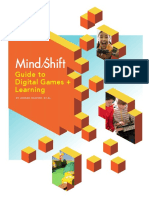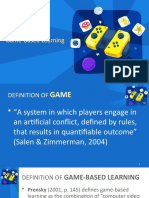A Study On The Effectiveness of Computer Games in Teaching and Learning
A Study On The Effectiveness of Computer Games in Teaching and Learning
Uploaded by
IJASCSECopyright:
Available Formats
A Study On The Effectiveness of Computer Games in Teaching and Learning
A Study On The Effectiveness of Computer Games in Teaching and Learning
Uploaded by
IJASCSEOriginal Description:
Original Title
Copyright
Available Formats
Share this document
Did you find this document useful?
Is this content inappropriate?
Copyright:
Available Formats
A Study On The Effectiveness of Computer Games in Teaching and Learning
A Study On The Effectiveness of Computer Games in Teaching and Learning
Uploaded by
IJASCSECopyright:
Available Formats
IJASCSE Vol 2, Issue 1, 2013 Feb.
28
A Study on the Effectiveness of Computer Games in Teaching and Learning
Syarifah Mariathy Syed Ahmad School of Computer Sciences, Universiti Sains Malaysia, Nurul Fatehah Mohamed Fauzi, School of Computer Sciences, Universiti Sains Malaysia
2 1
Athira Azrin Hashim, School of Computer Sciences, Universiti Sains Malaysia, Wan Mohd Nazmee Wan Zainon School of Computer Sciences, Universiti Sains Malaysia,
4
Abstract
Games, especially computer games are becoming one of the tools of education. Nowadays, the usage of computer games as an educational tool has become a worldwide trend. An early assumption suggests that since the appeal of computer games can engage interest and motivation, thus it is a wise step to use computer games for the purpose of educating. This is because students often get bored with the learning process; therefore we need to find creative ways to teach them. Instead of the usual, dull lesson in class, educators are trying out new ways to attract the interest of students to focus the lessons and thus increase their understanding, with one of it using computer games. A lot of papers supported the idea of computer games being effective as an aid for students. Educators alike also agreed that it is one of the ways to gain students interest in their lessons. Before coming to the ultimate conclusion that computer games are a good choice, first of all we need to study carefully the effectiveness of using computer games as an educational medium. This paper aims to study the effectiveness of computer games in learning among students. Issues on the integration of computer games in formal education are and the current status of educational gaming in learning were reviewed in this paper. We focused on higher learning context which is for university students.
Keywords: Computer Games, Teaching and
Learning, Effectiveness of Computer Games
I. INTRODUCTION
Today, the computer gaming industry has become bigger than the world music and movies industries. Sales of the most popular games are now breaking records for sales of entertainment products. The influence of computer games over the youth of today is akin to that of cultural influence of various fields such as music, personal interest, etc. [1]. Games, especially computer games are becoming one of the tools of education. Many had agreed of its usefulness and effectiveness towards educating students. Instead of the usual, dull lesson in class, educators are trying out new ways to attract the interest of students to focus the lessons and thus increase their understanding, with one of it using computer games. Computer games provide a good environment for learning as agreed by a lot of researchers [2]. There are a lot of questions arise from this issue, mainly about the curiosity on whether computer games are effective to be used as formal education tools as computer games are primarily used as a form of entertainment. Teachers and educators alike are initiating steps to incorporate computer and video games into learning. Students are found to be feeling motivated to use the game as it is more exciting and interesting rather than just sitting in class and listening to the lecture. By using computer games, students actively participate to solve problems in order to finish a level in the game. With this, we could see that students can learn and practice the lessons through computer games. This paper explores the effect of using computer games for education in learning among students. In other words, what are the
www.ijascse.in
Page 1
IJASCSE Vol 2, Issue 1, 2013 Feb. 28
things that students achieved when they attempt to learn with the aid of educational computer games. The current status of computer games as an educational tool in education level is also evaluated for this paper. The study is also to suggest computer games as a formal educational tool in educations. The motivation to do this research is based on the current trend of increasing user of computer. Questions like can computer games help students in terms of educations or if it is just solely for entertainment purpose are one of the main motivation for this paper. Since there seems to be a lot of negativity surrounding computer games and how they affect the students grades badly, it is understandable to find out whether there are any positive sides of computer games and if all types of computer games are suitable for educational purposes. The significance of this paper is that whether computer games are suitable and effective to be used in education and what type of games are suitable. Some of the related research paper even suggests that computer games to be included in formal teachings in schools and universities.
II. RELATED WORK
There are a lot of games that can be used to serve as learning tools. Strategy games that require internal decision from the gamers and high situational awareness are a common learning games such as chess and Scrabble are very popular in schools to train the students mind to be active. Virtual simulations and serious games, which are video games that are used for training, advertising, simulation, or education, provide a high level of interactivity not easily captured in traditional teaching/learning environments. Problem-solving games can be used as a practice for students to solve mathematical and real-life problems. A lot of games are also created and designed to train your brain such as Solitaire and crossword puzzle [1]. There are a lot of games designed for the purpose of more formal educational aids for students and for various fields such as mathematics, literature and etc. One of the related works by (Hwang et al, 2011) is
Chinese Idioms String Up Puzzle game for literature, which is like crossword puzzle, is a text reconstruction online program developed by the Digital Game-Based Learning Laboratory, National Taiwan Normal University in Taiwan, aimed to help motivate students to learn Chinese idioms. This game is intended for users of all ages, not just students [3]. Another game that is to support bilingual education is discussed in a research paper by (Kalemis, 2011) called Bilingual Cooperative Intergraded Reading and Composition. This game is adapted to meet the needs of limited English Proficient children in bilingual programs who were transitioning from Spanish to English reading [4]. A web-based game that helps students understand mathematical concept of scales are also introduced to elementary students in Taiwan to help them understand maps better. Electronic maps with local districts are designed in which the students are familiar with. By adding characters navigating on the map and solving mathematics problems to reach the goal, this learning system created atmosphere of exploring and learning in fun atmosphere [5]. E-GEMS or the Electronics Games for Education in Mathematics and Science project are introduced by the collaborating teams centred at the University of British Columbia (UBC). The participants for the program are mainly from Queens University, several schools in British Columbia and Ontario. It managed to produce some guidelines for designing educative computer games as a result from the project. Some of them give accentuation on gender specific criteria, user interface improvements and enabling participants to participate together with their peers as a group [1]. There are also games designed to enlighten students about more humanized issue such as the web game His and Her, developed in Sweden in 2006 for teenagers that focuses on gender issues. The game even has a teacher manual and their own television developed and it aimed to encourage teenagers to reflect upon gender issues in society and to make players question themselves, their own opinions and behaviour towards others. Since the results were good, they decided to continue using the games for teenagers and keep trying to develop more games [6]. In Malaysia, a study has been conducted on 2011 to test the usability of games using a learning game called "Jelajah" that is designed to teach pre-school children to learn the Malay words. It was developed based on a solid
www.ijascse.in
Page 2
IJASCSE Vol 2, Issue 1, 2013 Feb. 28
research on educational approaches. The main purpose is to gather the understanding on children acceptance of a product and how children evaluate whether it is usable, fun and user friendly. The result shows that the level of satisfaction towards the game is high, which shows it is effective [7]. Some issues need to be considers when trying to integrate computer games in education Incorporating computer games as formal educational tool is not an easy task to be done. There are many considerations to take care of creating computer games and it must be according to specific model of game-based learning to fit for educational purpose. Rogers Theory Diffusion of Innovations consists of few characteristics for diffusion in innovation [8]. Learning and games is related by the way games and leaning events happened. Learning with games, through games and by making games are three different kinds of games used in educational system K12. Theory of diffusion consists of five criteria measured during the development of educational games. The criteria involve relative advantage, compatibility, complex ability, trial ability and observe ability. Those criteria will match the purpose of creating educational games but the solution must also outweigh the cost involved. Traditional method of learning using textbooks and pen-and-pencil approach can be replaced using playing computer games to understand a subject better. Example of application such as programming language games (LOGO), mathematics-solving games (EGEMS), simulation games for military training (DOOM II), adventure games in corporate environments (SIMS, LIFE), and many more also found in previous research [1]. Paradigms of computer games as a tool of education lies in the interface design, pedagogical knowledge and domain expertise. In the future, gaming world will evolve with the collaboration with technological advance such as artificial intelligence, computer graphics and 3D animations and this will open new possibilities for computer games as a tool for education. Another concern in making educational computer games is the issues of making the content of the game itself become educational [9]. Creating interactive games is important to determine the success of delivering educational
content for students. Thus, to make sure educational computer game to be integrated as formal education, it is important for game designer and developer to get a deep understanding on the purpose to use game as learning tool. Researchers have proposed several learning style theories and one of it is the FelderSilverman learning style which has been widely adopted and validated by various studies. In one study [10], two versions of an educational computer game are developed based on the sequential/global dimension of Felder Silvermans learning style theory for investigating the effect of learning styles on student's learning motivation. It is found that students who learned with games that match their learning style had significantly higher motivation than those who learned with games that do not match their learning style. Moreover, the pre-test and post-test results in this study showed that the learning achievements of the first mentioned group is far better than the latter. It is concluded that if students prefer one game over another, it does not necessarily mean they will learn better with what they have chosen. Hence, it is important to provide individual students with personalized learning content to best benefit them. This finding emphasizes the necessity of considering the learning style of individual students when developing educational systems. Furthermore, it also provides evidence to support the development of adaptive systems. Another study, investigated the possibilities of optimizing computer games as a pedagogy tool especially focusing at students' social skill development [11]. The study revolved around classroom sessions and activities that involved computer games. The findings in this paper revealed that students were more communicative among themselves and willing to work in groups. However, it is important that these students are divided according to their intelligence level. Students work best with those they are comfortable with and have the same level par of intelligence. The main issue is not what instrument or technology is used for teaching and learning, instead it is how it is applied and diffused. Teachers have to be proactive to make sure that these computer games are incorporated effectively for the sake of students' social skills development i.e. selecting students and dividing them accordingly based on their capabilities and intelligence. This paper gives the idea that with
www.ijascse.in
Page 3
IJASCSE Vol 2, Issue 1, 2013 Feb. 28
properly chosen computer games, educational practitioners can use gaming within learning environments. There are many challenging subjects students have to face, for example programming. Therefore it is important to investigate how educational games help to improve students learning attitude. A study discussed the perception of students towards using educational games as a learning medium for programming [12]. In the findings, students showed high motivation in using the game and they believe games make the subject fun and interesting as well. Students also interested in playing educational computer games related to their studies in order to understand the subject better in effective learning style. Other than that, games promoted their cognitive development such as critical thinking and challenged their understanding about the subject.
research which are the students at Universiti Sains Malaysia, Penang. Diverse area of study among students will affect the survey as humans psychologies are wide to be explored. Non probability sampling of respondent is used to sample research data. The sampling form that we would use is convenience sampling where any first 40 students that help answering the questionnaire will be chosen. Based on their answer, the characteristics that they had during their experience on using computer game is known later.
IV ANALYSIS AND FINDING
A survey was done to get information about learning behaviours using computer games on students in Universiti Sains Malaysia, Penang, Malaysia. About 40 respondent responses were collected and analyzed for this research. From the result, there are 15 students (38%) that play games when they are feeling bored. Students feeling bored when there are not interested in doing or listening to something. While studying alone, reading books, doing exercises and other related activity can cause high possibility of their studies faded away. Thus, games can be used to make the content of specific subject fun and interesting. One university that were using games to replace pen and pencil approach of doing exercise in a course in Computer Fundamentals in 2003 at Norwegian University of Science and Technology (NTNU), Trondheim, Norway named Age of Computer (AoC) [13]. From AoC experimental results, it is reasonable to assume the game can give a lot of contribution in learning the course. In this case, students were playing games as suggested by their lecturer and give good response on evaluations for the game. Students were encouraged to do exercises and they understand the subjects better compared to only reading references.
III. RESEARCH METHODOLOGY
This research uses quantitative study, also called descriptive quantitative research as we are focusing on the study of the effectiveness of computer games on learning for students. The use of computer games in studies may affect students in various ways. The behaviour of students towards using computer games is observed in the research. Other than that, students behaviour will be quantified in our research. The research is conducted using survey research techniques. In the survey, questionnaire is formed appropriately based on research objectives. The questionnaire construction is done in proper way and using technology available to create online questionnaire in Internet which is free and easy to use rather than distributing the question by hand. Online survey created with Google Docs will be used. From the survey, 40 sets of questions are expected to be answered by students from Universiti Sains Malaysia, Penang. Data collected will be tabulated and analysed. Quantitative research method is used as the focus of this paper is to study the effects of using computer games on students. Students mostly play computer games and a lot of characteristics can be described throughout survey and observations. We set the population for the
Figure 1. Reason for Playing Computer Games
www.ijascse.in
Page 4
IJASCSE Vol 2, Issue 1, 2013 Feb. 28
Figure 1 shows the pie chart of respondents answer on the questions about the reasons they play computer game on their own without being asked by anyone. This shows that computer games are well liked by students. Thus, by giving students the opportunity to play whilst studying will make them feel eager to study. Computer game can be another option for students to study as computer games can be effective in many ways. Technologies nowadays has made people more attracted to activities involving simulations, web-based applications, online video games and other applications that are available in the markets. Today, people would browse through any information in the Internet rather than traditional method of learning or looking through piles of books when digging information that they required. It is the same for students in newer generation that would choose to study using high technology method and in this case using computer game.
simulation game while playing it. The games content would consist of characters which is the representative of the player. In the process of problem-solving, the characters would have to pass through many stages to complete the mission and win the game. In order to win, students would be motivated to finish their mission first. In the end of the game, they have already developing problem-solving skills. In the other hand, by playing educational games students would instill the emotional development within themselves as the process of completing a game mission required stable emotions to be able to solve the problem exists in the games. If player where in a bad shape at the moment, their results would not be excellent. Player would feel excited at the beginning of playing game, curiosity increase and then the excitement would be different till they feel relieved at the end. Emotion would change according to the situation that they encounter at the moment. In educational game, students would understand the heart of the problem in of that game and while understanding the problem, they would get to know better the educational content inside it. Effectively, they would not feel burdensome to understand the content in the game compared to understand the same content in classroom.
Figure 2: Respondents opinion on issues of computer games as formal educational tool is study.
Based on Figure 2, it clearly shows that students would agree with the idea of incorporating computer game as a formal educational tool in studies. In response for the questions, computer game is another alternative to teach with the use of images, animations, colourful texts, sounds and other elements in computer games. Those elements can be combined together and give an excitement to learn more in the subject matter. Computer game would affect student learning abilities when their brain stimulates response by playing it. Playing games would give benefits in social and emotional developments [14]. Social development can be nurtured by engaging students in a suitable gaming environment. As for the real-world context, students would learn how to apply the strategies and techniques learnt from the characters of the
Figure 3: Respondents interest on playing games as suggested.
Figure 3 shows 22 respondents (55%) say "Yes" to consider playing game that is suggested by their lecturer that is related to their studies. Another 16 respondents (40%) answered "Maybe" as they are not really sure whether to play game that is suggested. We can say that students are not really interested in playing unfamiliar games that they do not know. We also found that reference books are still the main option in studies. The idea of using games to replace books involved long agreement to go on with. We do not have clear description on the game perspective in learning. The main purpose of games that is widely known is only
www.ijascse.in
Page 5
IJASCSE Vol 2, Issue 1, 2013 Feb. 28
for fun. Thus, for learning purpose, we need to be exposed to educational gaming or also known edutainment. At early stage, edutainment works on children as their childhood development can be enhances with the help of games. However, at students level, gaming for a specific or subject would be hard to be implemented and is still not widely known in universities in Malaysia.
gaming environment. Based on related works, there are a lot of established educational computer games that are being used by educators. Some countries have even accepted computer games as a formal tool of education, for example Sweden that even allowed the game "His and Hers" to be adapted as television shows. Therefore, we suggest that computer games are suitable to be used as formal educational tools while reference books are still the main option in studies as preferred by students and educators. For future works, we would like to further study the elements that make computer games a preference for educators and the types of games that is the most suitable to be used as an educational tool. We would also like to develop a framework for educational computer games that will be used in specific course in universities. We hope that peoples perception towards computer games become more positive as it has its own benefits in learning.
Figure 4: Respondents opinion on the issue of replacing references books for study.
REFERENCES
[1] R. Jayakanthan, "Application of computer games in the field of education", The Electronic Library, Vol. 20 pp. 98 102, 2002. [2] A.C. Siang & R.K. Rao, "Theories of Learning: A Computer Game Perspective," IEEE Fifth International Symposium on Multimedia Software Engineering (ISMSE'03), pp.239, 2003. [3] M.Y Hwang, J.C Hong, T.F Hsu, & Y.J Chen, "The relation between students' anxiety and interest in playing an online game," IEEE International Games Innovation Conference, pp.37-39, 2011 [4] K. Kalemis, "Can Games Based Learning Assists Teachers in Achieving the Aims of Curriculum to Bilingual Students of Different Ethnic Minorities?," Third International Conference on Intelligent Networking and Collaborative Systems, pp.76-83, 2011 2011 [5] J.H Chiu, C.C Cheng, & K.H Huang, "More than Learning Mathematics: The Impact of Mathematics Games on Learning in Geography and Community Education," IEEE Fourth International Conference on Digital Game and Intelligent Toy Enhanced Learning (DIGITEL), pp.141-143, 2012. [6] K. Danielsson, & C. Wiberg, "Participatory design of learning media: Designing educational computer games with and for teenagers", Interactive Technology and Smart Education, vol. 3, pp. 275 - 291, 2006. [7] M.D Ismail, S. Ahmad, Kamal, & Dahari M.K.M., "Measuring usability of educational computer games based on the user success rate," Humanities, Science & Engineering Research
Figure 4 above shows majority of our respondents do not agree with the use of computer games to replace main references which is books. They still choose traditional ways to studies. None of our respondent had the experience of playing games that is related to their subject matter. The answer may change if any games had been developed in their studies. We conclude our findings with the effectiveness of computer games in learning actually can be expressed as the way a player deals with the games itself. People think differently from each other. Thus, their personal development that mentioned earlier may vary. One of the skills that can be developed by playing games especially educational games is problem-solving skills and other skills may be developed eventually as time goes by.
V. CONCLUSIONS
The effects of using computer games for education in learning among students are their learning motivation have increased. The possibilities of optimizing computer games as pedagogy tool especially focusing at students' social skill development are also found. Computer games also promoted their cognitive development such as critical thinking and challenged their understanding about the subject. Social and emotional development can be nurtured by engaging students in a suitable
www.ijascse.in
Page 6
IJASCSE Vol 2, Issue 1, 2013 Feb. 28
(SHUSER), International Symposium on, pp.5660, 2011 [8] S. Egenfeldt-Nielsen, "The Challenges to Diffusion of Educational Computer Games" 2010 [9] S.M Fisch, "Making Educational Computer Games "Educational"", Proceedings of the 2005 conference on Interaction design and children, ACM New York, NY, USA, pp 56 - 61, 2005. [10] H.Y Sung, G.J Hwang, C.M Hung, I.W Huang, "Effect of Learning Styles on Students' Motivation and Learning Achievement in Digital Game-based Learning", International Conference on Advanced Applied Informatic, pp 258-262, 2012 [11] A.R Latif, & J. Sheard, "Social Skills among Students while Playing Computer Games in Class: A Case Study in Malaysia", International Conference on Future Computer and Communication (ICFCC 2009), pp.177-181, 2009 [12] R Ibrahim,& A. Jaafar, "Using educational games in learning introductory programming: A pilot study on students' perceptions," International Symposium in Information Technology (ITSim), vol.1, pp.1-5, 2010 [13] G. Sindre, L. Natvig,& M. Jahre, "Experimental Validation of the Learning Effect for a Pedagogical Game on Computer Fundamentals," IEEE Transactions on Education, vol.52, no.1, pp.10-18, 2009. [14] D. Claire, & B Robert, "Understanding Game Design for Affective Learning", in Proceeding CSERC11 Computer Science Education Research Conference, , ACM Digital Library, pp. 81-86, 2011.
www.ijascse.in
Page 7
You might also like
- Module 4 - Teaching StrategiesDocument22 pagesModule 4 - Teaching StrategiesSteven Paul SiawanNo ratings yet
- CHAPTER 2 - Representations and Problem Solving Giuliana Dettori and Tania Giannetti ITD CNR, Genova, Italy p56Document314 pagesCHAPTER 2 - Representations and Problem Solving Giuliana Dettori and Tania Giannetti ITD CNR, Genova, Italy p56Erika BarqueraNo ratings yet
- Refleksi Cikgu DinDocument28 pagesRefleksi Cikgu DinMastura SabryNo ratings yet
- Artificial IntelligenceDocument5 pagesArtificial IntelligenceNavneet KaurNo ratings yet
- The Impact of Game-Based Learning On The Achievement of Learning Goals and Motivation For Learning Mathematics - Literature ReviewDocument16 pagesThe Impact of Game-Based Learning On The Achievement of Learning Goals and Motivation For Learning Mathematics - Literature ReviewHydon Biñas LibradillaNo ratings yet
- Gaming in Education: Using Games As A Support Tool To Teach HistoryDocument10 pagesGaming in Education: Using Games As A Support Tool To Teach HistoryPixtaNo ratings yet
- Students' Perceptions Towards Educational Games Learning Media in MathematicsDocument5 pagesStudents' Perceptions Towards Educational Games Learning Media in MathematicsMaira SalsabilaNo ratings yet
- GameDocument8 pagesGamegabriela harghelNo ratings yet
- Dian Indah Safitri - ArtikelDocument13 pagesDian Indah Safitri - ArtikelDIAN INDAH SAFITRINo ratings yet
- Game Based Learning DesignDocument9 pagesGame Based Learning Designd101320No ratings yet
- The Effects of Educational Computer Games On Students' Attitudes Towards Mathematics Course and Educational Computer GamesDocument5 pagesThe Effects of Educational Computer Games On Students' Attitudes Towards Mathematics Course and Educational Computer GamesnidaNo ratings yet
- Digital Game-Based Learning: An OverviewDocument13 pagesDigital Game-Based Learning: An Overviewtysonchaplin100% (1)
- A Literature Review of Gaming in Education Research ReportDocument5 pagesA Literature Review of Gaming in Education Research ReporteyewhyvkgNo ratings yet
- Game Based AssessmentDocument5 pagesGame Based Assessmentmerinrosekurian95No ratings yet
- Computers & Education: Bokyeong Kim, Hyungsung Park, Youngkyun BaekDocument11 pagesComputers & Education: Bokyeong Kim, Hyungsung Park, Youngkyun BaekyusiNo ratings yet
- SWTIRIA MOYDocument8 pagesSWTIRIA MOYVladimir MarkovskyNo ratings yet
- The Effect of Computer Games On Speed, Attention and Consistency of Learning Mathematics Among StudentsDocument6 pagesThe Effect of Computer Games On Speed, Attention and Consistency of Learning Mathematics Among StudentsDiah Dwi SantriNo ratings yet
- Math Education Game For Primary SchoolDocument4 pagesMath Education Game For Primary SchoolWemerson MonteiroNo ratings yet
- Etec 510 - Literature ReviewDocument10 pagesEtec 510 - Literature Reviewapi-241822761No ratings yet
- My Comments On Another EipDocument10 pagesMy Comments On Another Eipapi-384680416No ratings yet
- Editorial Play and Learn Potentials of GDocument7 pagesEditorial Play and Learn Potentials of GtashamiabernalNo ratings yet
- "Math-Tinik" Math Learning App For Android: Jerome C. Gonzales Deford Jeck Fernandez Domingo Bustamante Jr. Maricar IcoDocument14 pages"Math-Tinik" Math Learning App For Android: Jerome C. Gonzales Deford Jeck Fernandez Domingo Bustamante Jr. Maricar IcoJerome GonzalesNo ratings yet
- Examining the Efficacy of GameDocument10 pagesExamining the Efficacy of Gameuyalexa164No ratings yet
- s10936 023 09983 yDocument21 pagess10936 023 09983 yLuís TeixeiraNo ratings yet
- Research - Gaming in EducationDocument10 pagesResearch - Gaming in Educationapi-283597245No ratings yet
- GameEnhancedLearning Meletiou EnglishDocument28 pagesGameEnhancedLearning Meletiou EnglishMaria MeletiouNo ratings yet
- Chapter I Impact of Game Based Supplementary Materials On Numeracy Skills Development Among Primary LearnersDocument12 pagesChapter I Impact of Game Based Supplementary Materials On Numeracy Skills Development Among Primary LearnersRicky Sto Tomas100% (1)
- 02 PDFDocument16 pages02 PDFAndrés SarmientoNo ratings yet
- Genius Snake GameDocument4 pagesGenius Snake GameMark MumbaNo ratings yet
- Educational Games (EG) Design Framework - Combination of Game Design, Pedagogy and Content ModelingDocument6 pagesEducational Games (EG) Design Framework - Combination of Game Design, Pedagogy and Content ModelingRachel RenNo ratings yet
- The Study On Learning Mathematics Through Art by Using Education Games Among Students at Secondary SchoolDocument14 pagesThe Study On Learning Mathematics Through Art by Using Education Games Among Students at Secondary SchoolMark Ordono100% (1)
- Outcome 4 Final Research Paper - Gaming To Improve GrammarDocument10 pagesOutcome 4 Final Research Paper - Gaming To Improve Grammarapi-276174938No ratings yet
- Effects of Educational Games Towards Senior High School Students LearningDocument9 pagesEffects of Educational Games Towards Senior High School Students LearningBarcenas Roger Jr.No ratings yet
- Literature Review of Game-Based Learning in The ClassroomDocument9 pagesLiterature Review of Game-Based Learning in The ClassroomdennisbheenanNo ratings yet
- Use of Gamification in Vocabulary Learning: A Case Study in MacauDocument8 pagesUse of Gamification in Vocabulary Learning: A Case Study in MacauReiraNo ratings yet
- Educational Digital Games: A Distraction or A Standard Learning Tool?Document4 pagesEducational Digital Games: A Distraction or A Standard Learning Tool?beeyen_No ratings yet
- The Impact of Video Games in Children's Learning of MathematicsDocument7 pagesThe Impact of Video Games in Children's Learning of MathematicsJohn Paul Canlas SolonNo ratings yet
- Gamification Integration ProjectDocument15 pagesGamification Integration Projectapi-490177257No ratings yet
- Game-Based Learning in Singapore Higher Education A Pilot StudyDocument11 pagesGame-Based Learning in Singapore Higher Education A Pilot StudyGlobal Research and Development ServicesNo ratings yet
- Baimau PPNCDocument15 pagesBaimau PPNCPhương LãNo ratings yet
- Gaming in EducationDocument7 pagesGaming in Educationapi-418671570No ratings yet
- Adriane-RESEARCH-PAPEr 3Document11 pagesAdriane-RESEARCH-PAPEr 3adrianeenerva0No ratings yet
- Investigating The Impact of Kahoot! On Students' Engagement, Motivation, and Learning Outcomes Ifrane Directorate As A Case StudyDocument9 pagesInvestigating The Impact of Kahoot! On Students' Engagement, Motivation, and Learning Outcomes Ifrane Directorate As A Case StudyInternational Journal of Advance Study and Research WorkNo ratings yet
- Sample Research Proposal For PHD in MathematicsDocument4 pagesSample Research Proposal For PHD in MathematicsEdson DustineNo ratings yet
- Advantages of GamesDocument2 pagesAdvantages of GamesDates TreeNo ratings yet
- The Design and Implementation of A Mathematics GamDocument11 pagesThe Design and Implementation of A Mathematics GamAlozie DavidNo ratings yet
- Games and LearningDocument32 pagesGames and Learningapi-75736613No ratings yet
- Game-Based LearningDocument2 pagesGame-Based Learningapi-88128715No ratings yet
- Critical Journal Dev - Program MathDocument8 pagesCritical Journal Dev - Program MathHendri Johan Tambunan11No ratings yet
- Computer Games and LearningDocument73 pagesComputer Games and LearningGlenn MalcolmNo ratings yet
- Effectivenessofusinggame PDFDocument9 pagesEffectivenessofusinggame PDFGlenda Manalo CochingNo ratings yet
- Chapter II Dewi Pah Revisi Concept Dan TheoriticalDocument20 pagesChapter II Dewi Pah Revisi Concept Dan TheoriticalDewy PahNo ratings yet
- INTRODocument8 pagesINTROCDT. NICDAO PRINCE ALREI G.No ratings yet
- Yabut 2019Document5 pagesYabut 2019bartolomeuzNo ratings yet
- Board Game Design To Learn About User Persona in Entrepreneurship Programme in Kurikulum MerdekaDocument11 pagesBoard Game Design To Learn About User Persona in Entrepreneurship Programme in Kurikulum MerdekaG MNo ratings yet
- Methodological Aspects of Online Teaching: Games and ToolsDocument6 pagesMethodological Aspects of Online Teaching: Games and ToolsYernur NurmukhambetovNo ratings yet
- Delyana - English Teaching by Project-Based Learning - Creating Game Made by Microsoft Power PointDocument18 pagesDelyana - English Teaching by Project-Based Learning - Creating Game Made by Microsoft Power PointDelyana EbNo ratings yet
- 64 Integration2010 ProceedingsDocument9 pages64 Integration2010 ProceedingsKhirulnizam Abd RahmanNo ratings yet
- Pedagogical Change in Mathematics LearningDocument19 pagesPedagogical Change in Mathematics Learningмаржан дуйсенNo ratings yet
- Guide To Digital Games + Learning: by Jordan Shapiro, Et AlDocument41 pagesGuide To Digital Games + Learning: by Jordan Shapiro, Et AlIva GolecNo ratings yet
- EmergingtechnologyDocument8 pagesEmergingtechnologyapi-286312914No ratings yet
- Simulated Teaching: Inggy Yuliani Pribady 0805980 (15 OCTOBER 2008)Document5 pagesSimulated Teaching: Inggy Yuliani Pribady 0805980 (15 OCTOBER 2008)Inggy Yuliani P , MPd.83% (6)
- Group1 Compiled ReportDocument187 pagesGroup1 Compiled ReportERVIC VICENTENo ratings yet
- 5es Lesson PlanDocument4 pages5es Lesson PlanYael BangayanNo ratings yet
- Articles 11111Document10 pagesArticles 11111Hanifa NorodinNo ratings yet
- Effects of Computer-Based Educational Games On Students' Achievement in ScienceDocument120 pagesEffects of Computer-Based Educational Games On Students' Achievement in ScienceMARIAN ROSE SUBREBEGA.No ratings yet
- Digital Game-Based Learning Introduction and Literature ReviewDocument9 pagesDigital Game-Based Learning Introduction and Literature ReviewBAEDAEBOKNo ratings yet
- Midterm Exams in Principles of Teaching 1 MontalbanDocument5 pagesMidterm Exams in Principles of Teaching 1 MontalbanCloud BelleNo ratings yet
- Quali ProposalDocument34 pagesQuali ProposalKanmani RengsamNo ratings yet
- Final ReportDocument13 pagesFinal ReportNoambuchlerNo ratings yet
- Introduction To Edtech 2Document16 pagesIntroduction To Edtech 2andrsange11No ratings yet
- Digital Game Based LearningDocument5 pagesDigital Game Based LearningVienne VelascoNo ratings yet
- Bridging Meaningful Play and Playful Learning - Supporting The Design Process of Gamification in EducationDocument3 pagesBridging Meaningful Play and Playful Learning - Supporting The Design Process of Gamification in EducationJohn ReyesNo ratings yet
- Game-Based LearningDocument17 pagesGame-Based Learningnulllll100% (1)
- 10275-Article Text-51594-2-10-20230623Document12 pages10275-Article Text-51594-2-10-20230623Alya Rohali HarahapNo ratings yet
- Towards Balancing Learner Autonomy and Pedagogical Process in Educational GamesDocument3 pagesTowards Balancing Learner Autonomy and Pedagogical Process in Educational GamesShraddha SakhalkarNo ratings yet
- Evaluation Rubric For Educational Games Laura St-MathDocument5 pagesEvaluation Rubric For Educational Games Laura St-Mathapi-233963987No ratings yet
- Game Based LearningDocument4 pagesGame Based LearningI Gede Perdana Putra NarayanaNo ratings yet
- Digital Game-Based Learning and Serious Games in EducationDocument6 pagesDigital Game-Based Learning and Serious Games in EducationEditor IjasreNo ratings yet
- Implementation of Game-Transformed Inquiry-Based Learning To Promote The Understanding of and Motivation To Learn ChemistryDocument13 pagesImplementation of Game-Transformed Inquiry-Based Learning To Promote The Understanding of and Motivation To Learn ChemistryrizkiyatulNo ratings yet
- Game Based Spelling LearningDocument5 pagesGame Based Spelling LearningMary Claire OndianoNo ratings yet
- Improving Grade 8 Struggling Readers' Reading ComprehensionDocument15 pagesImproving Grade 8 Struggling Readers' Reading ComprehensionMA. KLAIRE FRANCES BADIENo ratings yet
- AfafegfegrgDocument16 pagesAfafegfegrgmilagros rosarioNo ratings yet
- Bibliography On Digital Game-Based Learn PDFDocument24 pagesBibliography On Digital Game-Based Learn PDFwindapsptaNo ratings yet
- HGGHGG PDFDocument7 pagesHGGHGG PDFruttinitNo ratings yet
- Dimitriadou Et Al 2020 Challenges in Serious Game Design and Development Educators ExperiencesDocument21 pagesDimitriadou Et Al 2020 Challenges in Serious Game Design and Development Educators ExperiencesPaola CastilloNo ratings yet
- Play Based Experiential LearningDocument21 pagesPlay Based Experiential LearningSimmi SuwasiyaNo ratings yet
- Emergingedtech Free Education Technology Resources Ebook 1Document149 pagesEmergingedtech Free Education Technology Resources Ebook 1api-259515978No ratings yet
- A BDocument23 pagesA BYou PremNo ratings yet

























































































